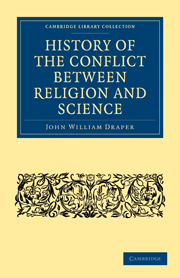The Destiny of Man
In 1884, American historian and philosopher John Fiske published The Destiny of Man, which discussed humanity's origin, destiny and place in the universe. A leading populariser of Darwin's theory in the United States and influenced by Herbert Spencer, Fiske considers views of human progress via evolutionary social change and the harmony between science and religion. The Destiny of Man is composed of sixteen chapters that anticipate philosophical questions from a typical non-scientific audience: the origins of atheism, the shifting hierarchal positions of humanity through history as proposed by Copernicus and later by Darwin, human brain size, and the 'dawning of consciousness' as a result of the growth and development of moral sentiment and inventiveness through natural selection. Interestingly, at the end of the book, Fiske discusses the historical power relationships of ruling governments and predicts that as humans evolve and become more civilised, war will eventually end.
Product details
October 2009Paperback
9781108005135
128 pages
229 × 152 × 11 mm
0.36kg
Available
Table of Contents
- Preface
- 1. Man's place in nature as affected by the Copernican theory
- 2. As affected by Darwinism
- 3. On the earth there will never be a higher creature than man
- 4. The origin of infancy
- 5. The dawning of consciousness
- 6. Lengthening of infancy and concomitant increase of brain-surface
- 7. Change in the direction of the working of natural selection
- 8. Growing predominance of the psychical life
- 9. The origins of society and of morality
- 10. Improvableness of man
- 11. Universal warfare of primeval men
- 12. First checked by the beginnings of industrial civilisation
- 13. Methods of political development, and elimination of warfare
- 14. End of the working of natural selection upon man
- 15. The message of Christianity
- 16. The question as to a future life.







